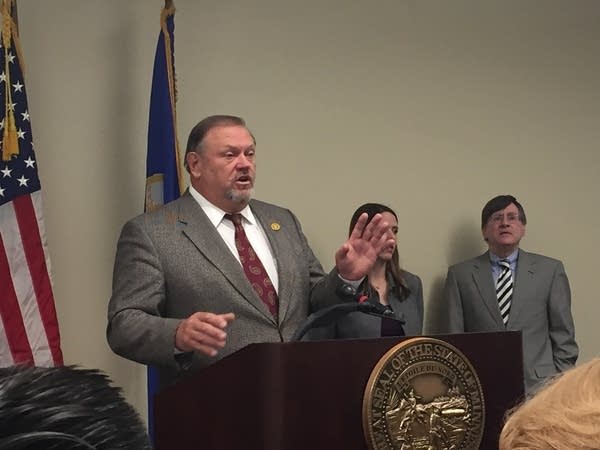Senate DFL budget plan sets up clash with House GOP

Democrats in the Minnesota Senate released a plan Wednesday for spending much of the state’s $900 million surplus on education, rural broadband and racial equity initiatives.
Not surprisingly, the Senate DFL budget targets have little similarity with the competing plan House Republicans released last week.
The Senate DFL plan spreads surplus money across several budget areas. It includes $300 million for an updated version of last session’s tax bill and $489 million in other spending, much of it one-time spending. It also leaves $111 million unspent.
House Republicans want the surplus divided between transportation funding and tax cuts, and they want no net increase in other spending areas.
Create a More Connected Minnesota
MPR News is your trusted resource for the news you need. With your support, MPR News brings accessible, courageous journalism and authentic conversation to everyone - free of paywalls and barriers. Your gift makes a difference.
There are big differences to resolve with the House, said Senate Majority Leader Tom Bakk, DFL-Cook.
“There’s plenty of time. But yeah, we’re a long ways apart," he said.
The Senate plan tracks closely with DFL Gov. Mark Dayton, who is proposing to spend $700 million of the surplus. Senate Democrats are following the governor’s lead with $91 million to address the state’s troubling racial economic disparities.
The money would go to a variety of education, job promotion and economic development programs, said Sen. Jeff Hayden, DFL-Minneapolis.
“A lot of it is going to be one-time money," he said, "so we are going to try to make sure it goes to places in which we can get the most bang from, in organizations that have a proven track record.”
House Republicans did not specifically include any equity-related spending in their targets. They also didn’t include any additional spending for education.
Senate Democrats have a combined $96 million for both K-12 schools and colleges. Sen. Katie Sieben, DFL-Newport, said their budget will include the preschool expansion sought by Dayton as well as an investment in school counselors and other support staff.
“The Senate DFL caucus’ commitment to education is very strong, and I think that our supplemental budget proposal reflects that,” Sieben said.
Republicans were quick to criticize the plan. Senate Minority Leader David Hann, R-Eden Prairie, described the additional spending as “reckless and unsustainable,'' given recent signs of a slowing economy.
Bakk insists the Senate proposal is “responsible.” He contends the House plan doesn’t add up when you factor in its ongoing transportation and tax costs. Bakk said he’s already warned GOP House Speaker Kurt Daudt that he can't both cut taxes and spend more on roads.
“I just don’t know where all the money comes from," Bakk said. "I mean, there’s clearly not enough money to do both of those bills. So, I would really encourage him if he wants to get a tax bill, start thinking about the Senate’s proposal on transportation, which doesn’t require general fund money.”
The Senate transportation plan relies on a gas tax increase, which Republicans oppose.
House Majority Leader Joyce Peppin, R-Rogers, said she was disappointed by the Senate targets. Peppin said Senate Democrats failed to prioritize transportation funding or tax cuts. She also rejected Bakk’s assertion that they can’t have both.
“Sen. Bakk gives us a false choice," she said. "He says we have to pick between transportation and middle class tax relief. But he’s forgetting that his caucus has decided to spend $800 million additional after we’ve already funded government. So, we have plenty of money to spend on our priorities of both transportation and middle-class tax relief.”
Still, Peppin said she’s optimistic that a compromise can be reached in the remaining weeks of session.
There are also big differences to resolve on borrowing for public construction projects. The House targets show room for a $600 million bonding bill. Bakk said the Senate’s bonding bill will likely top $1 billion. Dayton has already detailed a $1.4 billion bonding proposal.